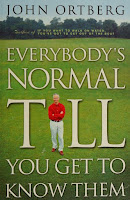 |
| (Amazon UK link) |
‘Everybody’s normal till you get to know them’ is typical of the author’s lengthy but memorable book titles. The overall theme is that we’re all damaged in some way; none of us is in full health, and that ‘normality’ is in fact almost impossible to attain. There’s a linguistic problem there which mildly annoyed me at times: ‘normality’ means ‘what people are like in general’, so if nobody is ‘normal’ then normality is in fact what the author describes as abnormality.
That’s a paradox which was never addressed. I prefer the word ‘healthy’ as used by other authors, acknowledging that few people are in good health (physically, emotionally or spiritually); the majority are in a state of semi-health, perhaps appearing to do the right things, but potentially with many problems on the inside.
Language details aside, the book is excellent. Ortberg unpacks Scriptural passages where relevant, mentions events in his family life where he has made mistakes, and gently demonstrates how so many of us - and he’s writing to Christian believers - are prickly, difficult to get to know, stressed, unable to share problems with anybody.
The first section of the book unpacks what he means by ‘normal’, and how far from this we all are; the second section is about getting closer to other people. What we need most is community: people we can trust, and enjoy being with, and with whom we can take of masks of pretence. There are chapters about empathy and acceptance, something that many in today’s church find difficult to do; Ortberg looks in detail at some of the Gospel stories to see how Jesus handled relationships.
The final section is about building stronger relationships in general, including an excellent chapter on forgiveness. There are some very thought-provoking comments about what forgiving really means as opposed to understanding or ignoring other people’s actions and behaviour. Again, Gospel accounts are unpacked, using modern language and analogies at times to get the message over.
The tone is generally light and friendly, which means that the book is easy to read, while giving a great deal to ponder. It’s written for Christians, assuming a general understanding of the Bible, and I would recommend this strongly to anyone with that background, particularly those who are feeling bruised or ignored by other believers.
Review copyright 2016 Sue's Book Reviews
No comments:
Post a Comment